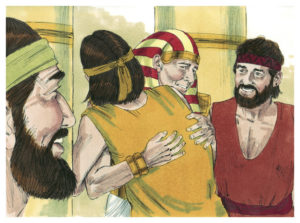 Matthew 18:21-35
Matthew 18:21-35
Romans 14:1-12
Genesis 50:15-21
Earlier in the week the David Walker, Bishop of Manchester was on thought for the day. In the light of Public Inquiry of the Manchester Arena bombing he was reflecting on this atrocity. He remembers the next day being asked by the press, “Do you forgive those who caused this devastation” “Not yet” was his reply.
Today’s readings centre around the themes of forgiveness and judgment.
In Genesis we return to the wonderful story of Joseph and his brothers. Jacob their father has just died, the brothers now expect Joseph to avenge their earlier cruelty towards him and so they seek his forgiveness. They fall at his feet and weep. Joseph assures them that all is forgiven. “Do not be afraid!” he tells them “God intended it for good, in order to preserve a numerous people.” What he is saying is the brothers’ jealousy and consequent heinous act of selling him into slavery actually saved the people of Egypt and beyond from starvation and therefore had a purpose. So Joseph forgives his brothers…..
Perhaps this good outcome made it easier for Joseph to do that or perhaps it had just been question of time? Because true forgiveness is a process, it’s a complicated business, it must work two ways, preferably with both parties on board and it takes time to work through.
I’m rather sceptical about the current trend, usually generated by the media, to apologise for any alleged misdemeanour, especially when it concerns the sins of the past by our ancestors. To me the gesture can have no real depth, in fact that is exactly what it is, a gesture.
In the gospels Jesus makes it very clear that forgiveness is central to our spiritual and emotional wellbeing. It is indeed fundamental to being part of the kingdom of God. Today Jesus tells Peter to forgive not only seven times but 77 times. Effectively, he is saying, forgiveness has no limits. To illustrate this, he tells the parable of the unmerciful servant.
In this story a servant owed ten thousand talents, a huge debt which could never be repaid. Yet when the servant begged to be given more time the king was compassionate and went beyond his request for giving him the entire debt. The king naturally expected his generosity to affect this man’s behaviour towards others. But instead the opposite happened. The King was furious,
“should you not have mercy on your fellow slave? as I had mercy on you?” In anger he hands him over to the jailers to be tortured, until he should pay back all he owed. “This is how my heavenly Father” Jesus says “will treat each of you unless you forgive your brother or sister from your heart.”
So, there we have an element of judgement creeping in but what Jesus is really trying to tell us is, if we truly understand how God forgives us, we should then be willing to forgive others, even those who may have brought hardship, unhappiness and misery to us.
However, to practise effective forgiveness, we need to start with ourselves, and that means forgiving ourselves. This is important because by forgiving ourselves we nourish our souls and overcome any residue guilt and resentment, both such negative emotions. But forgiving ourselves and others comes from an understanding of how much God has loved and forgiven us. Knowing this we can pass on this grace, this act of forgiveness, we have experienced to others. This is the point Jesus is making in the parable – the master in the story hoped that by forgiving his own servant, this servant in turn would forgive his servant.
In the epistle Paul develops the theme of judgement. Here he is urging us not to be too hard on each other. In the church at Rome, he says there were some who believed that in Christian liberty, the old taboos were gone; for example, old food laws were now irrelevant. On the other hand, there were those who were still keen to do the “right thing” They believed that it was wrong to eat meat and they believed in the rigid observance of the Sabbath.
In the same way today, Christians share differences of opinions in ethical matters like homosexuality, abortion and euthanasia. But Paul tells us to go easy on these issues for there is a higher office to account to, “You, then, why do you judge your brother or sister? Or why do you treat them with contempt? For we will all stand before God’s judgment seat”. Romans 14:10
We may well stand before God’s judgement seat. But as we do, we will know that the God we stand before is a God of love and a God of forgiveness.
In the same way we also are called to be people of love and people of forgiveness.
